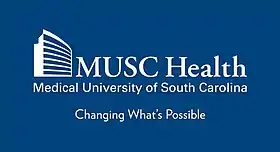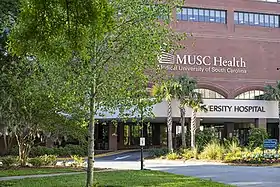MUSC Health University Medical Center
MUSC Health University Medical Center is a university hospital associated with the Medical University of South Carolina, based in Charleston, South Carolina with additional sites located throughout the state.
| MUSC Health University Medical Center | |
|---|---|
 | |
 MUSC Health University Medical Center entrance. Photo taken by Brennan Wesley | |
| Geography | |
| Location | 171 Ashley Ave, Charleston, SC, USA |
| Coordinates | 32°47′10″N 79°56′52″W |
| Organisation | |
| Care system | Public |
| Funding | Non-profit hospital |
| Type | Teaching |
| Affiliated university | Medical University of South Carolina |
| Network | MUSC Health |
| Services | |
| Standards | ANCC Magnet Designation[1][2] |
| Emergency department | Level I trauma center[3] |
| Beds | 865 Licensed Beds |
| History | |
| Former name(s) | Medical University Hospital (1955), MUSC Medical Center (1985)[4] |
| Construction started | 1951 |
| Opened | 1955 [5] |
| Links | |
| Website | muschealth |
| Other links | muschealth |
Founded in 1824 in Charleston, MUSC is the state’s only comprehensive academic health system, with a unique mission to preserve and optimize human life in South Carolina through education, research and patient care. Each year, MUSC educates more than 3,200 students in six colleges – Dental Medicine, Graduate Studies, Health Professions, Medicine, Nursing and Pharmacy – and trains more than 900 residents and fellows in its health system. MUSC brought in more than $298 million in research funds in fiscal year 2022, leading the state overall in research funding. MUSC also leads the state in federal and National Institutes of Health funding, with more than $220 million. For information on academic programs, visit musc.edu.
As the health care system of the Medical University of South Carolina, MUSC Health is dedicated to delivering the highest-quality and safest patient care while educating and training generations of outstanding health care providers and leaders to serve the people of South Carolina and beyond. Patient care is provided at 16 hospitals (includes owned and affiliated), with approximately 2,700 beds and four additional hospital locations in development; more than 350 telehealth sites and connectivity to patients’ homes; and nearly 750 care locations situated in all regions of South Carolina. In 2023, for the ninth consecutive year, U.S. News & World Report named MUSC Health University Medical Center in Charleston the No. 1 hospital in South Carolina. To learn more about clinical patient services, visit muschealth.org.
MUSC has a total enterprise annual operating budget of $5.9 billion. The nearly 26,000 MUSC family members include world-class faculty, physicians, specialty providers, scientists, students, affiliates and care team members who deliver groundbreaking education, research and patient care.
The MUSC Health Transplant Center is one of the top ten kidney transplantation centers in the nation.[6] The MUSC Health Transplant Center is supported by the only HLA Laboratory in South Carolina. MUSC Health University Medical Center is the regional referral center for the Lowcountry of South Carolina.
Plans were announced in 2017 for a new 126,000-square-foot outpatient facility to be constructed in the former JCPenney building at Citadel Mall in West Ashley. The two-story complex will be completely renovated with the lower level used for surgery and procedures, radiology and therapy; a second floor will hold physician offices and examination rooms.[7]
The Phase I Replacement Hospital with 156 beds was completed in 2008 and a new Bee Street Parking Garage opened for employee and rehab patient parking. The Pediatric Trauma Center/Emergency Room was re-built, opening in first quarter 2009. The long-term plan includes 4 more phases of construction which will provide an updated trauma center, adult rooms and expanded Children's Hospital.
Allegations of racism
In the summer of 1969, Coretta Scott King, the widowed wife of the civil rights hero Dr Martin Luther King Jr., led a strike of hundreds of black women nurses at MUSC. Although the strike failed to win the workers their desired collective bargaining rights, it did bring their concerns of unequal treatment to the attention of MUSC management.[8]
In 2018 many black women working at MUSC argue little has changed and at least two workers sued for redress, claiming they have been the victims of systemic racism. Workers allege that whites are given favoritism in promotions and are less often fired, that the grievance panel discriminates against blacks, and that there is a long-standing problem with racist language and behavior involving managers. "There are a handful of white managers who are just notorious for being racists," said Kerry Taylor, a labor historian at nearby Citadel Military College.
The hospital vehemently denies these allegations.[8]
Transgender healthcare
In late 2022, following pressure from Republican lawmakers, the MUSC ended its program providing gender affirming care to trans adolescents.[9]
References
- "MUSC Health achieves Magnet recognition again, reinforcing commitment to nursing excellence". whosonthemove.com. May 8, 2020. Retrieved May 10, 2022.
- "American Nurses Credentialing Center (ANCC) – Find a Magnet Designation". nursingworld.org. Retrieved May 10, 2022.
- "SC Trauma System". scdhec.gov. Retrieved May 10, 2022.
- "Medical University of South Carolina". www.u-s-history.com. Retrieved May 10, 2022.
- "Medical University of South Carolina Quality Enhancement Plan 2017" (PDF). musc.edu. Retrieved May 10, 2022.
- "Scientific Registry of Transplant Recipients (SRTR) Transplant Centers". srtr.org. Retrieved May 10, 2022.
- Hoff, Patrick (2018-06-08). "MUSC to open facility at Citadel Mall". Charleston Regional Business Journal.
- Elk, Mike (January 15, 2018). "South Carolina hospital accused of tarnishing Coretta Scott King's legacy". The Guardian. Retrieved January 15, 2018.
- Renaud, Tim. "MUSC ends pediatric/adolescent transgender hormonal care".